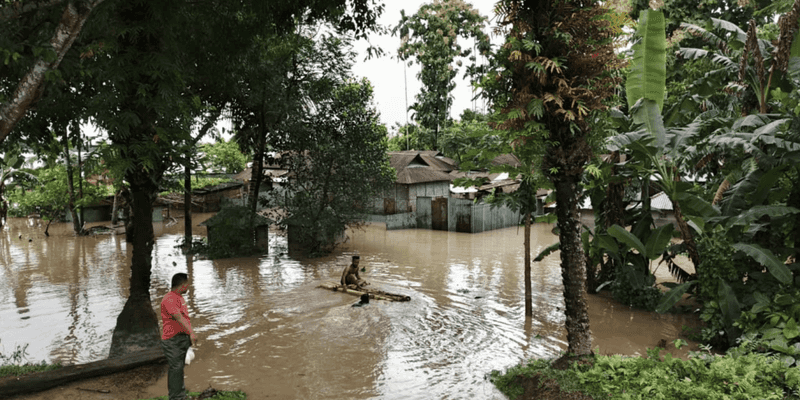
Every country has developed in its own way. Malaysia, Southeast Asia’s richest large country per capita, has seen unrivalled growth in the region and is repeatedly told by international agencies that it is on the cusp of joining the club of high-income nations. Beneath the surface, however, this economic growth has come at a great cost to the Malaysian people and its environment.
The destruction of labour parties and independent labour organising, in the name of anti-communism, has crippled progressive vehicles for politics, leaving Malaysian civil society and oppositional politics unrooted in the struggles of the masses. While Malaysia has lifted many out of absolute poverty, privation is rife amongst the urban and rural poor. In its bid to attract foreign capital, wages were suppressed and unions neutered through co-optation by the state.
In Malaysia’s quest for modernity, our environment suffered. Deforestation, starting under British rule, has continued ceaselessly since. Our ranking as the 12th most biodiverse country has not given the political and economic elite any pause as they allow this destruction and plunder to continue. Its disregard for the way of life of Malaysia’s indigenous peoples has nakedly shown its allegiance to profits over people.
Malaysia's failed New Deal moment
The New Deal, a slate of government programs and regulations initiated under President Franklin D. Roosevelt in the United States in response to the Great Depression, has interesting parallels in Malaysia. In response to the racial riots of 1969 — largely attributed to the unsubstantiated claims of inequality between races, the Malaysian state moved to enact its own ‘New Deal’ to redress this inequality. The New Economic Policy (NEP) was carried out in the name of ethnic redistribution, as the British colonial authority had divided the occupations and sectors of the economy along racial lines.
While the NEP did much for the poor Malays in lifting many out of poverty, its restructuring of the economy was, in fact, a ‘palace coup’ to bring about a new class of Malay capitalists, at the expense of local Chinese capital. It was successful in creating a middle class of consumers but maintained a large and precarious underclass of informal service workers and state-dependent farmers. The proponents of the NEP, the dominant Malay nationalist party UMNO, maintains its hegemony of this flimsy regime of capital accumulation through a combination of ethno-religious jingoism and appeals to multicultural harmony.
What a new New Deal would mean for Malaysia
Before we begin to speak about the ‘Green’ in a potential Malaysia Green New Deal, we need to consider the foundation on which it will be built, namely the ‘New Deal’ aspect of such a project. This ultimately involves a return to the fundamentals that characterized the American post-war boom and reduction of inequalities. Four dimensions of this New Deal would be the universalization of education and healthcare, an inclusive jobs program, a more equitable social security system and, most importantly, the recentering of labour as the source of value in society.
Malaysia has done relatively well in terms of its provision of healthcare and education in comparison to other middle-income countries. Nonetheless, even these modest gains are threatened by the draining of public resources into private schools, universities and hospitals to the detriment of those who can ill afford even these public services. Making education and healthcare a universal right for all in Malaysia would serve as an important initial equalizer between the classes and across the urban-rural divide. The building up and subsequent defence of the quality of service it provides can only be then undertaken by an empowered mass movement.
The Malaysian state’s maintenance of the large informal sector has to be addressed if this mass precarity is to end. While the state has had a flawed track record in creating employment, it remains the only institution that has the resources and reach to bring about a meaningful jobs program. In addition to that, the decoupling of large swathes of the economy from the hand of the state would allow millions to determine their own economic fate, in the form of democratic control by workers as opposed to privatisation.
In terms of social security, Malaysia has large state-linked financial institutions that make contributions to a savings and retirement plan mandatory. However, this once again, excludes the masses in the informal sector and the rural poor. These institutions have been historically mismanaged and utilized to benefit an elite layer of income earners. Coupled with a genuinely democratic jobs program, the inclusion of these groups must be accompanied with a meaningful social safety net.
Lastly, the most ambitious aspect of a potential Malaysian ‘Green New Deal’ would be a society-wide recognition of the centrality of labour to every aspect of our lives, be it in the dignity of its work or the value it creates for the whole of society. What this would mean in real terms is the reorientation of state institutions, policymaking and politics, away from the interest of capital towards that of labour. It would be wishful thinking to imagine that this reorientation would occur, as the NEP did, with a revolution from above. Such a massive shift would require the mass mobilisation of those whose interests it carried, an organic movement of the vast majority who labour, from being a class in itself to a class for itself.
Why it must be Green
Malaysia wears all the trappings of civilization and modernity. It has developed a consumer society that has a massive carbon footprint, generates a great amount of municipal waste and frivolously uses our water resources. Our economy is also reliant on two sectors that are very environmentally destructive, the palm oil sector — of which we are the world’s second largest producer, and fossil fuels which we continue to exploit with no talk of limits or reductions.
Its development has done little to improve the biodiverse environment we have inherited. Unsustainable monoculture, irresponsible use of nitrogen-based fertilizers and mass deforestation were employed in advancing Malaysia’s economy to the next stage. Once there, under the helm of former prime minister Mahathir Mohamad, massive projects were undertaken in a haste to catch up with the likes of Taiwan and South Korea. Poorly implemented megaprojects, such as our heavy industries, national car project and the massive dams in the state of Sarawak, have taken a massive toll on the environment and indigenous peoples.
While it may be worthwhile to seek justice from actors who have caused the most environmental harm, what is more immediately urgent is the reorganisation of Malaysia’s economy away from these two sectors towards those which restore what we have lost maximally. Cultural norms around reduced consumption, environmentally enhancing modes of agriculture and aggressive research into the reuse of raw materials we generate would serve as the starting points to redress the harm we have caused the environment both locally and globally.
The basis of this environmental restoration must be ultimately rooted in a decolonialised relationship between Malaysian society and nature itself. The soil, our forests, the air we breathe, must all be seen, not merely as resources for our reproduction, but as a part of our society that we nurture and grow. For these ideas to take root in Malaysia, our New Deal cannot just be a reversion to mass production and consumption, and economic growth for its own sake. A genuine Green New Deal must have the restoration of nature as its founding principle alongside the democratic controls of labour.
Why it will be democratic
The NEP ultimately benefited a small elite tremendously even as this elite continues to argue that the crumbs that trickled down to the masses constitute progress. Still today, this regime of capitalist accumulation remains untouched as the aspiration to build a local Malay capitalist class goes on, despite the state’s repeated attempts to do so.
The power to shape economic outcomes must return to the Malaysian people. This monumentally important aspect of our lives cannot be left in the hand of self-interested elites who look out for their own and continually unaccountable to the masses. Democracy must be a cornerstone when organizing society, both politically and economically.
Malaysia’s highly centralised and bureaucratic state institutions will require much pressure and work to reform. Introducing democracy into this state will be no easy task but as the African American anti-slavery activist Frederick Douglass knew “power concedes nothing without a demand”. While alternatives for economic democratisation are known in the form of cooperatives and the more traditional forms of industrial democracy, the reform of the state will require much larger feats of engineering, innovation, and artistry. Nonetheless, it is one that has to be taken if we are to transform the institutions that fundamentally carry water for capital against labour.
The history of capitalist development in Malaysia has placed it within the global supply chain, albeit without a strong position in it. This means that we are subject to the disarticulation of production — the breaking up of production into smaller, more specialised processes and scattering them across the world — leaving us at the mercy of global corporations who can leave for places with cheaper labour and lower taxes.
While it may be impossible to decouple from the global value chain and finance capital in the near term, the relocalisation of the production of essential goods and services must be pursued. Nationalism or chauvinism must not be the driver of this change but a push for genuine economic sovereignty. Resisting the language of the ‘international division of labour’ as a cover for capital’s freedom to go where it pleases, Malaysia must take the lead in pushing for a global agreement for countries to trade and produce on equal and democratic grounds, very much in the spirit of the long-dead New International Economic Order from the Non-Aligned Movement in the 1970s.
Where do we go from here?
Malaysians do not have any historical, let alone institutional memory of mass movements for social justice. The Bersih (clean in English) rallies of the last decade for free and fair elections were largely an urban, middle class and partisan affair. Other large scale protests of recent memory have been ethnonationalist or reactionary in nature. For there to be any resurgence of action by the public, the masses must be organised.
A nationwide mass movement will be needed to push and see through a Malaysian ‘Green New Deal’. Such a movement that can move this agenda for profound change needs to be one that crosses racial, class and political lines. Organisation will need to begin at the community and workplace level, confederated into larger bodies that will wield the people’s power and be accountable to them. These assemblies will have to endure the long process of debating and negotiating the demand and its implementation at a local and national level.
The lack of local elections, strong community organisations and unionisation will mean that the organising of assemblies will be an extremely difficult undertaking since it will be basically starting from scratch. Nevertheless, this presents a unique opportunity to lay the foundation for a vibrant civil society. Activists and social groups must introduce the principle of self-government into the organisations and structures they build if these organs are to have legitimacy and longevity. Only this notion that the masses can be taught to govern at all levels can break the recurring instances of ‘the iron law of oligarchy’, that so often ends in bureaucratisation and corruption of political parties and institutions.
Jeremy Lim is the secretary and project coordinator for Imagined Malaysia, working on themes of political economy and capitalism in Malaysia and Southeast Asia.




